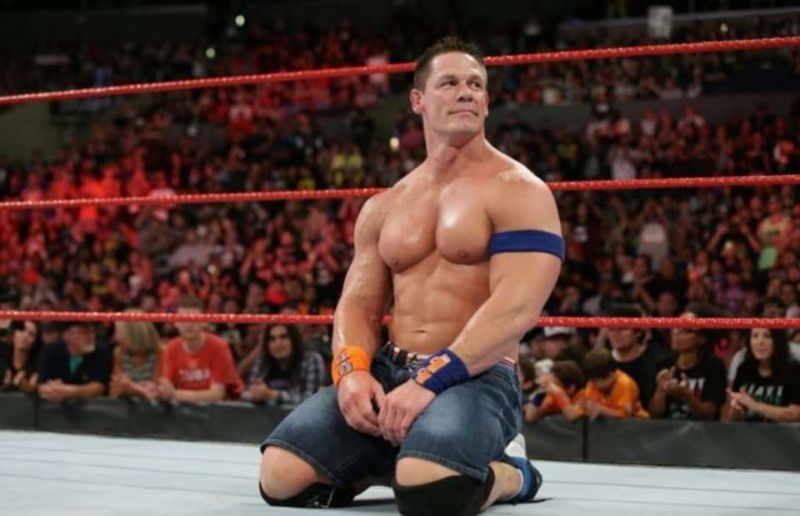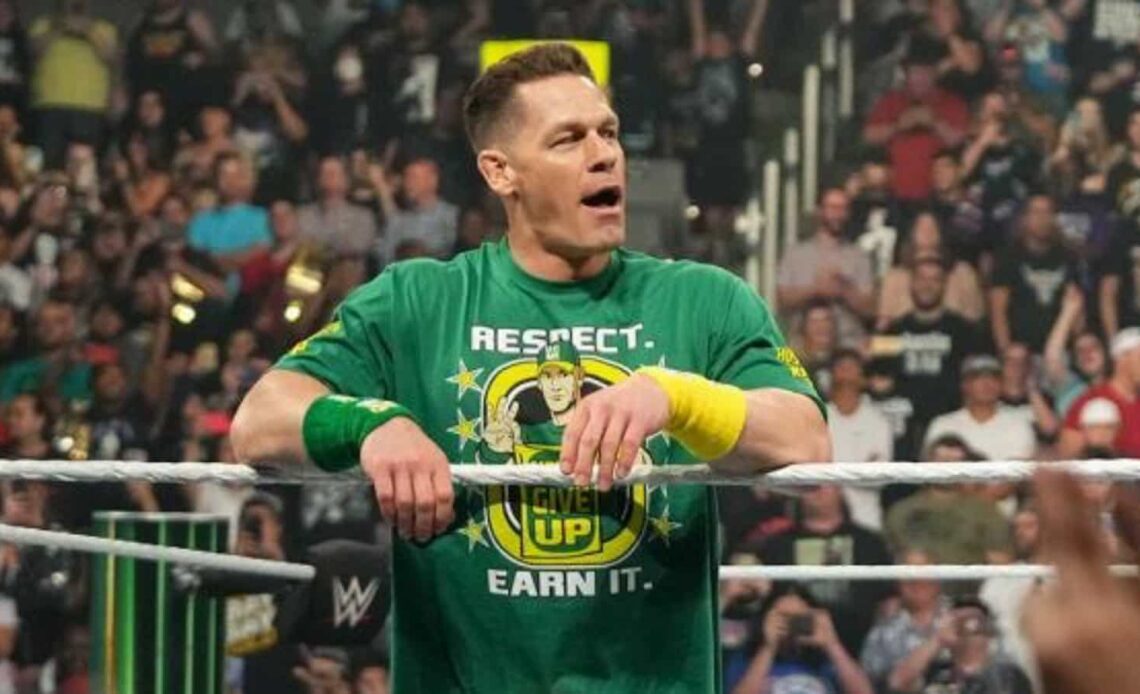Professional wrestling has long been a peculiar mix of athletic prowess, soap-opera drama, and cultural commentary. Over the decades, it has evolved from pure in-ring spectacle to a platform where exaggerated characters symbolize real-world emotions, conflicts, and dilemmas. Among the most iconic figures in the wrestling world is John Cena — a 16-time WWE Champion, actor, philanthropist, and pop culture icon. Yet, in the meme that has recently circulated widely across social media, Cena isn’t body-slamming an opponent. Instead, he’s pointing angrily toward the audience, shouting: “Everybody, including that one kid right there, is a toxic, dysfunctional relationship.” The camera then cuts to a young boy in Cena merchandise, wide-eyed and heartbroken.
This meme, while humorous on the surface, captures something profound about modern society, especially when we reflect on themes of hero worship, parasocial relationships, the toxicity of certain fan cultures, and the emotional rollercoaster that defines much of our current media consumption.
Parasocial Bonds and the Cult of Personality
At its core, the meme highlights the fragile dynamic between fans and celebrities — especially in entertainment platforms like WWE, where the line between fiction and reality is often blurred. Wrestling fans, particularly younger ones, form powerful parasocial relationships with their heroes. They wear the shirts, memorize the catchphrases, and defend their idols online with almost religious fervor. John Cena has long been a “babyface” — the wrestling term for a good guy — preaching messages of hard work, hustle, loyalty, and respect.
To imagine him suddenly turning around, pointing at a young fan, and calling them “a toxic, dysfunctional relationship” flips the script in a hilariously exaggerated yet telling way. It reflects a cultural shift where fans are beginning to realize that their idealized perceptions of public figures can be harmful — not only to themselves but to the celebrities as well. Celebrities are human beings, flawed and often overwhelmed by the expectations thrust upon them.
The Meme as a Mirror of Online Culture
We live in an age of online hot takes, Twitter wars, Reddit meltdowns, and TikTok call-outs. Fan communities, while built around admiration, frequently spiral into negativity, entitlement, and gatekeeping. The phrase “toxic fanbase” is no longer rare — it’s a recurring theme in discussions about everything from Marvel movies to K-pop fandoms. Fans can be supportive and loving, but also obsessive and aggressive.
In this context, John Cena’s accusatory shout becomes a metaphor for the moment when creators or celebrities finally snap back. It echoes real-life incidents like when Billie Eilish pushed back against the body-shaming narratives created by supposed “fans,” or when Star Wars actors like Kelly Marie Tran left social media due to overwhelming harassment.
That “one kid” in the meme becomes symbolic of all fans who cross boundaries, thinking they own a piece of the person they admire. The kid’s facial expression — a mixture of betrayal, confusion, and sadness — is both hilarious and heartbreaking. It’s the realization that the relationship you thought was built on love was actually just one-sided projection.
Wrestling’s Unique Ability to Parody Life
WWE has never shied away from poking fun at itself or the world around it. Its storylines have often paralleled political events, cultural movements, or societal issues. From the satirical Mr. McMahon “corporate boss” era to the rise of anti-hero Stone Cold Steve Austin, wrestling thrives on conflict and contradiction. It takes real human problems and cranks them up to 11, turning them into entertainment.
This meme, though not an official WWE segment, plays into that tradition. It feels like something that could happen in a WWE ring — a storyline where a beloved hero, under pressure, lashes out at his most loyal followers, revealing the cracks beneath the surface. It’s theater. It’s drama. It’s catharsis.
But beneath the laughter, there’s also a question: are we, as audiences, complicit in turning our entertainers into emotionally exhausted performers, pushed to constantly meet impossible standards?
The Satirical Undertone
The brilliance of this meme lies in its exaggeration. Of course, John Cena didn’t actually berate a child in the middle of a WWE event (at least not seriously). The quote is fabricated, but its impact resonates because we understand the absurdity of the situation — and its connection to the real world. The satire is potent because it exaggerates a truth: the modern relationship between public figures and their followers can be dysfunctional.
It also lampoons the current generation’s obsession with being “called out.” On the internet, public shaming has become a form of performance art. The idea that Cena — a symbol of unwavering positivity — would suddenly snap and call out a literal child taps into the fears and fascination around cancel culture, public accountability, and internet drama. In essence, the meme asks: “What if your hero decided you were the villain?”
A Commentary on Innocence and Disillusionment
Zooming in on the kid in the second frame, the meme takes a darker, more poignant turn. The boy, decked out in Cena merch, represents innocence. He is the embodiment of fandom at its purest: uncritical, devoted, and joyful. And yet, in a split second, he’s publicly condemned by his idol.
This parallels the moment in every fan’s life when they must reckon with the reality of imperfection — when a favorite actor is caught in a scandal, when a sports team betrays expectations, or when a political leader fails to live up to their promises. The disillusionment stings, even more so when it’s unexpected. The meme, then, becomes a snapshot of that universal human moment: the collapse of an ideal.
Humor as a Coping Mechanism
Ultimately, the meme is funny because it is absurd. The idea of John Cena — a figure so synonymous with positivity that he granted over 650 Make-A-Wish wishes — turning heel on a child is hilarious precisely because it’s so unlikely. Humor like this allows us to confront uncomfortable truths in a way that feels safe. It gives us permission to laugh at our own emotional investments, to recognize the dysfunction in our media relationships, and to question our expectations.
Comedy has always been a lens through which we view social discomfort. From George Carlin’s tirades to Saturday Night Live’s parodies, humor allows for critique without accusation. This meme is no different. It’s a punchline wrapped around a genuine concern: have we, as a culture, become too entitled, too obsessive, and too toxic in our adoration?
The Power of a Meme
In the age of social media, a single meme can spark introspection, satire, and communal laughter. The image of John Cena angrily pointing and condemning a young fan as a “toxic, dysfunctional relationship” is more than a funny edit — it’s a commentary on the increasingly blurred lines between celebrity and follower, admiration and obsession, entertainment and identity.
As we scroll through endless content, form attachments to public figures, and engage in online debates, we might do well to remember that even our heroes have limits. And maybe, just maybe, we shouldn’t take it too personally if one day, they point in our direction and say, “Everybody, including that one kid right there…”
Because sometimes, the best way to heal a dysfunctional relationship — with our idols, our culture, or ourselves — is to laugh at it, learn from it, and move forward.
